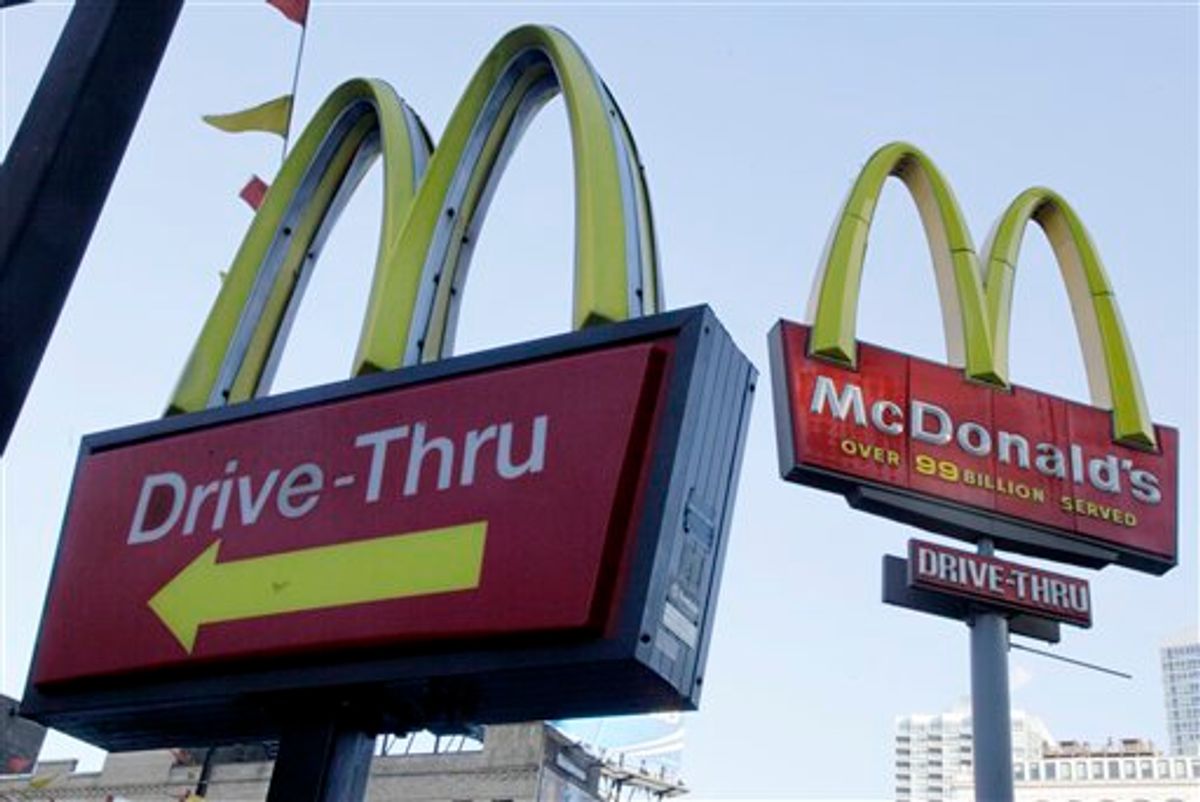Big Industrial Ag pretends to go organic. PC behemoths mimic Apple products. Barack Obama goes to the right of the Republicans on civil liberties. Mitt Romney suddenly portrays himself as a left-leaning moderate on immigration. It seems no matter the arena, the most cliched move in corporate and political combat is to co-opt an opponent’s message, expecting nobody to notice or care.
But as inured as we are to this banality, it’s still shocking to see corporate America transform the message of organized labor into a sales pitch for ... corporate America. Yes, according to the New York Times last month, that's what's happening, as new ads are “tapping into a sense of frustration among workers to sell products.”
One spot for the Las Vegas Convention and Visitors Authority (read: the casinos) shows a woman climbing onto her desk to demand a vacation. Another for McDonald’s implores us to fight back against employers and “overthrow the working lunch.” Still another for a Coca-Cola subsidiary seizes on the stress of harsh working conditions to create buzz for a branded “Take the Year Off” contest.
“Marketers are adopting the theme of workers’ rights at a time when unions themselves are confronting declines in membership and influence,” notes the Times. “In effect, some labor experts say, they are turning a pro-worker theme on its head to serve the corporate interest.”
In one sense, this is good news for organized labor -- at a moment when unions are under assault, the ads reflect polls showing persistent mass support for both the concept of worker solidarity and the economic outrage voiced by worker protests. Indeed, companies wouldn't be echoing such themes if they didn't know they were wildly popular.
And yet, that’s also why organized labor can’t take too much solace. Image-wise, the ad campaign undermines unions by effectively severing the popular pro-worker message from the labor movement brand. Preposterously, the spots insinuate that workers can get better treatment -- and wield real power in the employer-employee relationship -- wholly without unions.
It’s a fantasy, of course. Not coincidentally, as union density in America has declined, so too have workers’ wages, benefits, workplace protections and negotiating power. Additionally, as the Economic Policy Institute documents, unions not only help their own members, they set industry-wide standards. So when unions lose ground, all workers lose out.
The ads imply the opposite by suggesting that individual workers don't need solidarity (i.e., collective bargaining, unions, etc.) to get ahead, and what’s particularly galling is that this message comes from interests that have been hostile to the labor movement.
For example, the Las Vegas Convention and Visitors Authority may ostensibly speak for a city with a comparatively high union density – but that’s not because that city’s key tourism industry is friendly to labor. On the contrary, the casino industry has often led vicious fights against unions.
McDonald’s and Coca-Cola are even worse. While the former touts the virtues of lunch breaks -- workplace benefits standardized through labor movement activism -- journalist Eric Schlosser has documented the fast food company's aggressive union busting. Meanwhile, the beverage conglomerate advertising the need for more worker vacations -- again, benefits originally secured through labor organizing -- has fought organizing drives in the United States and has faced international outrage over alleged anti-union violence abroad.
Put it all together, and you see the sleight of hand: In the same way rapacious oil companies try to green-wash their brands to align them with environmental sentiment, the particular industries and companies airing these ads are subtly “worker-washing” their brands in an attempt to equate themselves with populist economic outrage.
That they can accomplish this with so few noticing proves that in the age of truthiness, anything can be corporatized -- even the anti-corporate zeitgeist.
David Sirota is a best-selling author of the new book "Back to Our Future: How the 1980s Explain the World We Live In Now." He co-hosts "The Rundown" on AM630 KHOW in Colorado. E-mail him at ds@davidsirota.com, follow him on Twitter @davidsirota or visit his website atwww.davidsirota.com.



Shares